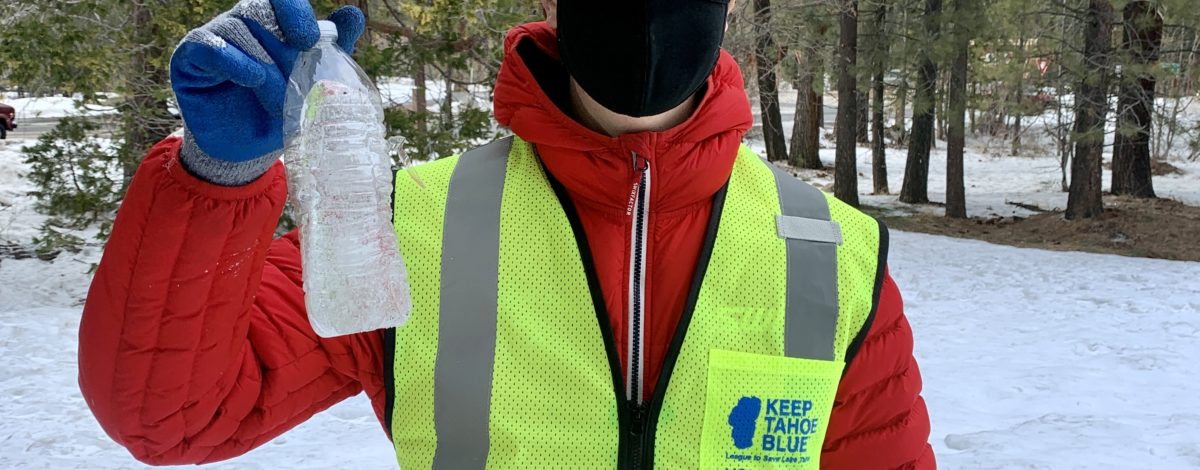Students Make Strides in Effort to Reduce Local Plastic Pollution
Lake Tahoe has big problems that are in small plastic pieces. To support efforts to reduce plastic waste, students from environmental clubs at four high schools in the region partnered with staff from local nonprofits to learn about plastic reduction
programs and how they can help Take Care of Lake Tahoe. On Earth Day 2021 their efforts, which began in the fall of 2019, came to fruition when the CEO of Raley’s agreed to create lasting, sustainable changes at their stores.
When the initiative began in 2019, students from North Tahoe High School, Truckee High School, Incline High School and South Tahoe High School learned about the prolific microplastics problem impacting Lake Tahoe from UC Davis Tahoe Environmental Research Center (TERC) AmeriCorps member Elise Matera and staff members at Sierra Watershed Education Partnerships (SWEP) and the Tahoe Water Suppliers Association (TWSA).
They learned that when plastic items are not properly disposed of—from single-use water bottles, sleds, and other items—they break down into tiny toxic pieces that contaminate Lake Tahoe’s pristine waters and beaches. The students were quickly brought up to speed on the microplastics crisis, the types of plastic, problems with recycling effectiveness, and sorting plastics into macro-, micro-, and nano-plastics.
The North Tahoe and Truckee Envirolution Club members were inspired to make a difference and formed a plastics sub-committee to assess which of these problems could be solved. With coaching by members of the plastic reduction collaboration (funded by a Nevada Division of Environmental Protection grant), the students surveyed their local Raley’s stores to come up with a list of all the ways plastic waste could be reduced. The group also participated in several collaborations with the
Raley’s team facilitated by TERC and SWEP, and developed a four-part action plan for Raley’s executive team to consider how they could reduce plastic waste locally.
The students presented their findings to the Raley’s executive team on Earth Day 2021 and highlighted three areas for improvement: plastic water bottles, plastic grocery bags, and plastic sleds and other toys that break apart easily. Other suggestions the team made included moving away from distribution of straws, plastic to-go ware, and plastic souvenirs.
Inspired by the presentation, Raley’s President and CEO Keith Knopf said, “We appreciate the students’ hard work and dedication to reduce microplastics and their thoughtful solutions for Raley’s to consider.” He continued, “We commit to several changes; eliminate plastic straws, switching to paper and reusable options; eliminate single use plastic silverware and switch to a compostable solution. We are proud to offer real silverware and plate options for people who purchase food to be
consumed in our Truckee store.”
Knopf also said his team would look into an email receipt system, implementing a refill station in the plastic water bottle aisle, and that it would explore options to reduce plastic grocery bag use—perhaps by offering reusable totes for their loyalty members. The company will also look into alternatives to plastic sleds, toys, and souvenirs.
“We appreciate the work Raley’s has done to implement sustainability initiatives in their stores and business model,” said Envirolution Club president Ben Anderson. “The Raley’s executive team is composed of environmentally-minded leaders committed to our community and local environment, and we are grateful to have the opportunity to work with them now and in the future.”
“The students and the Plastic Reduction project staff ended the meeting uplifted that change and progress is possible,” said Heather Segale, Education and Outreach Director for the UC Davis Tahoe Environmental Research Center. “The problem is big, but solutions can be found through collaboration, communication, and by caring enough to put the right groups together. We want to thank Raley’s for their commitment to our local community and for their willingness to spend time with students and take the lead to make these changes.”
Learn more about the microplastics problem at Lake Tahoe at https://storymaps.arcgis.com/stories/0a2ceba61c47470e8e18566268f9bfcf

